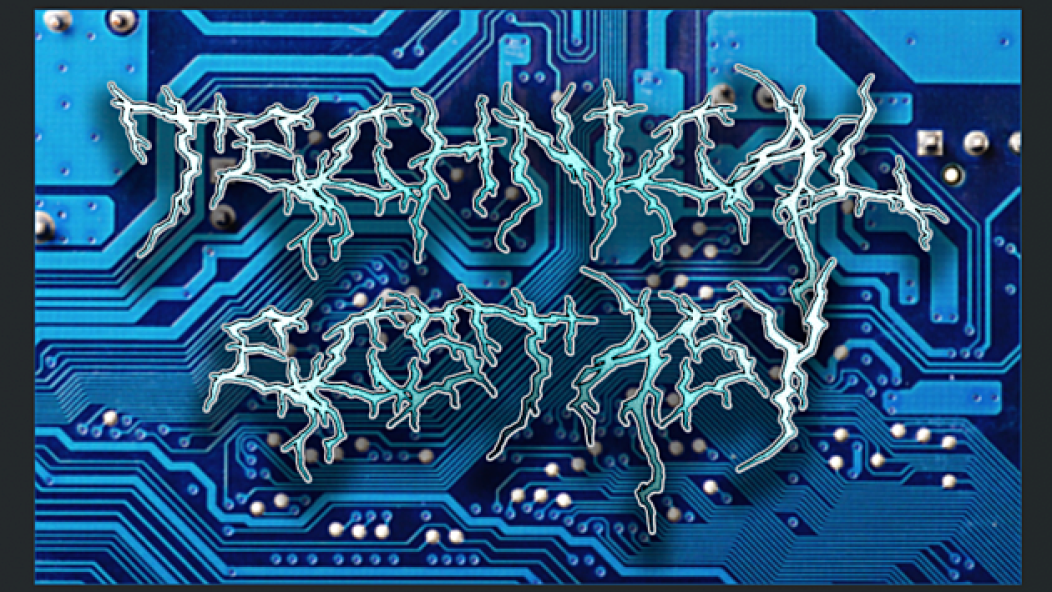
Technical Ecstasy #5: Core (and More)
…
In this column, I delve into the best tech-saturated underground metal from every spectrum and persuasion. Oftentimes, blatant technicality destroys metal, overblowing it and stealing precious limelight from songwriting and composition. However, some musicians manage to wrangle their runaway mechanical skills, transforming what would otherwise be gibberish into imaginative (or just plain heavy) works of art.
…
This year has already smothered with techy releases from across the metal board — in fact, it’s hard to keep up. Not every star shines as brightly as the next, though, but at that point it’s just a matter of personal preference. As such, I’ve tried to keep the breadth wide in this edition of the column: we have techy metalcore, techy deathcore, and good ol’ technical death metal (or just tech-death as most of us call it now).
This breadth, though, brings me to a point: initially, this column was intended to focus on technical death metal, but with an ultra-wide lens (capturing technical deathcore for instance). I think future editions, though, will slowly see the scope creep out of death metal derivatives and alike toward other genres. I always want to keep tech-death in my rearview mirror, but it’d be interesting to discover how technicality thrives in other styles.
To that end, feel free to comment below with any techy recommendations you might have — not just tech-death, anything goes: thrash, speed, power, etc. I’ll be sure to give everything and anything a spin. For now, enjoy these three.
…
Mire — Shed
June 18, 2018
…
…
Immediately pummeled by swaths of boisterous gallups, the metalcore-of-yore side of me chortled with pure delight. The riffs on Shed groove just as hard as they meander about the fretboard — you just don’t notice as much, and that’s the point. It’s technicality, embedded, something I’ve brought up in prior editions of this column. The -core vocals, sometimes clean, add a polished sheen to the overall mix. The songwriting involves numerous eager transitions: thick, chord-laden choruses to fast single-note melodies to super-rhythmic open-string cadences.
Also noteworthy about Shed: the songs don’t all sound the same. Sure, the songwriting maintains its guiding principle of groovy ascensions toward riffy climaxes throughout. Sometimes, though, Mire will take a slower, more methodical route toward a song’s peak. Other times, they blast right to it, echoing influences of tech-death proper. Even if you want to call it groove metal, there’s enough nuance and instrumental fluency to call it technical. Also, watch out for the wild guitar solo or two.
…
Phasma — Phasma
June 20, 2018
…
…
I love (good) deathcore, which sucks. Yes, most deathcore is trite and overwrought, even for moderate fans of the subgenre. But it also sucks for me, because it falls upon me to prove how some deathcore deserves a second listen. Some deathcore deserves appreciation, actually. It’s not an easy task, this whole convincing business, especially when the subject itself is so inherently inflated and, quite honestly, hard to take seriously. Usually, though, it turns out to be technical deathcore which captures the attentions of otherwise unwilling/uninterested listeners. Leave it to the sense of “seriousness” imparted by such heightened levels of precision, complexity, etc.
So here’s some technical deathcore (which even features sax). Repetitive chugs, breakdowns, and slams all make their appearance, albeit latticed into a complicated (definitely Meshuggah-inspired) framework. But holy shit, especially on “Postmortem Acquisition,” Phasma hits fast and hard, angular and unpredictable. Forgoing outright melody for mind-bending, down-tuned riffage (and the occasional pig squeal) was definitely the “deathcore” decision. However, techy, less brutal passages sleeken the package, plus great tempo changes which make use of that aforementioned Meshuggah influence.
…
Exocrine — Molten Giant
August 17, 2018
…
…
Tapping the mainline of tech-death’s saturated arteries is Exocrine and their latest output Molten Giant — here, execution is the name of the game. Tropes, instead of being recycled, are reimagined and creatively rearranged. The result is a wild gamut of tech-death constants: impossible guitar solos, super-fast single-note riffage, and stimulated, beastly growling. Even though not experimental or progressive in that sense, Exocrine have landed where they’re setting the bar among ultra-riffy brethren like Soreption. Here are some of my words from my premiere last month:
As with every song on Molten Giant, “Backdraft” is rife with easily hummable melodies strung together by transitions which include everything from chugging microbursts to spin-off guitar leads. The band knows about blasting, too, as the song’s midsection dictates: riff harder, stronger, faster. Things then dissipate into a more upbeat, nuanced rhythm-based section featuring another bonkers (but tasteful) solo, all before returning to the chorus. This undulation is a prime example of Exocrine acting as tacticians vs. demolitionists, too. Molten Giant is not dizzying you at every turn (e.g. it offers plenty of repeating sections); rather, it builds tension and drama to high points only to smash things to smithereens with barbarically primitive weaponry.
…










